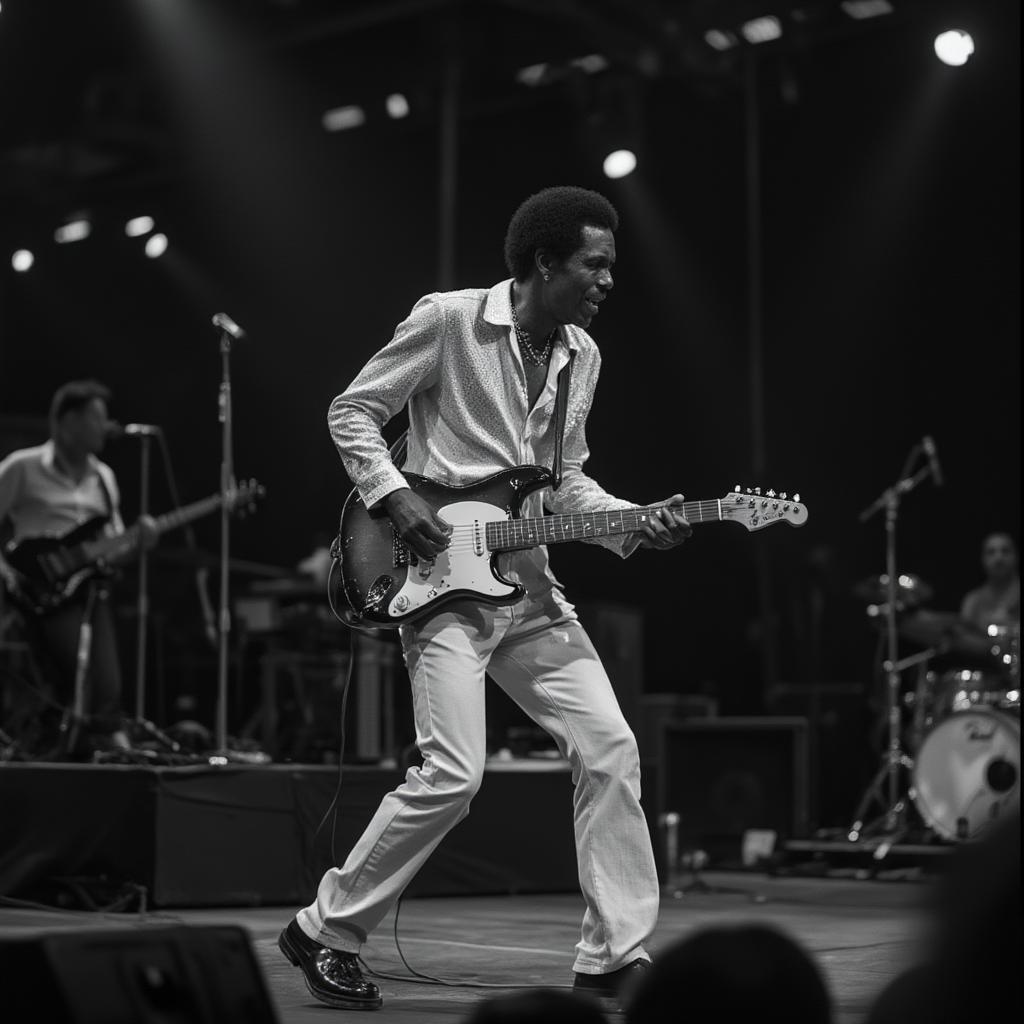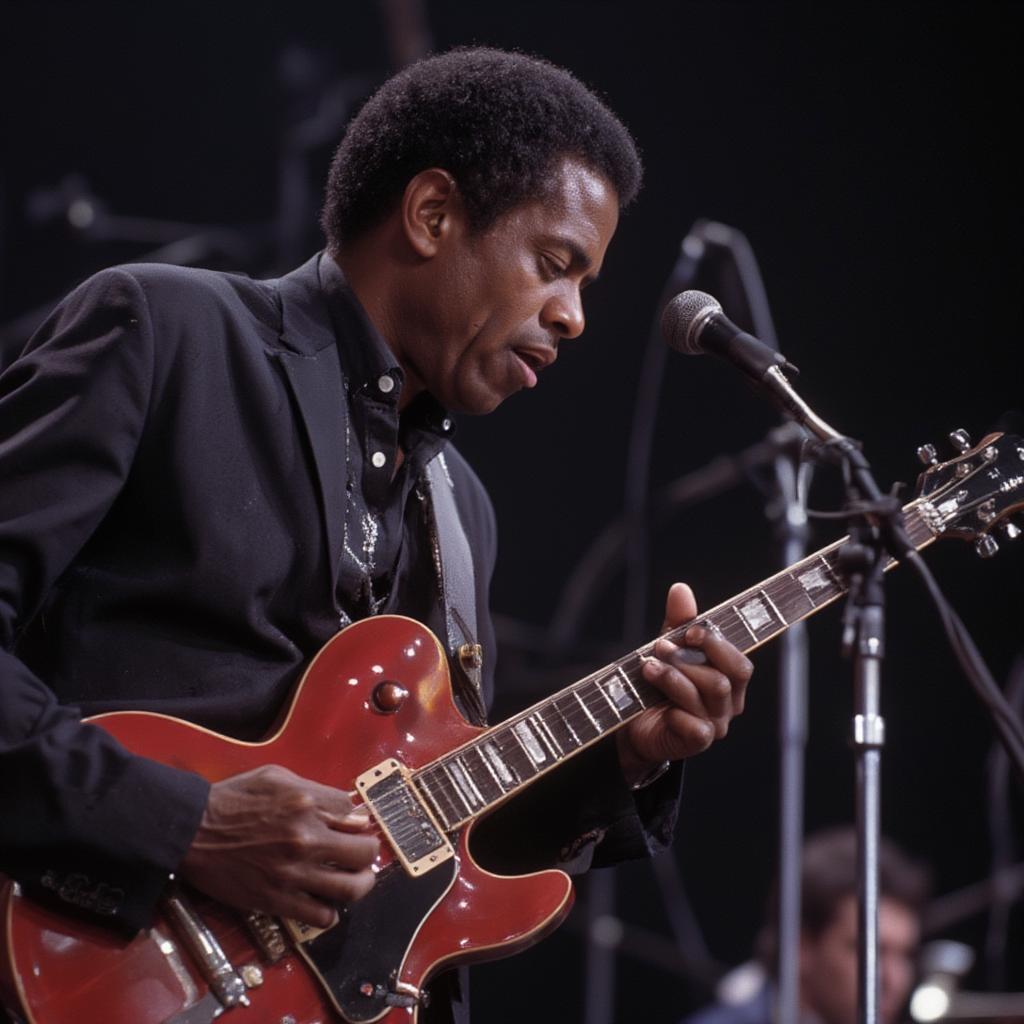Chuck Berry’s Enduring Legacy: How His Rock and Roll Music Shaped Generations

Chuck Berry, a name synonymous with the raw energy and rebellious spirit of early rock and roll, wasn’t just a musician; he was an architect of a sound that would resonate through generations. His iconic guitar riffs, catchy lyrics, and stage presence laid the foundation for countless artists who followed, solidifying his place as one of the most influential figures in music history. In this article, we’ll delve into the heart of Chuck Berry’s rock and roll music, exploring its origins, impact, and lasting legacy.
The Genesis of a Rock and Roll Legend
Berry’s story is a fascinating blend of musical influences and personal experiences. Born in St. Louis, Missouri, his early exposure to blues, gospel, and country music helped shape his unique style. Unlike many of his contemporaries who came from the blues or country backgrounds, Berry’s music was a synthesis of these influences, creating a fresh, exciting sound that captured the attention of a young generation. He wasn’t just singing; he was telling stories that resonated with the everyday lives and aspirations of teenagers.
What Made Chuck Berry’s Sound Unique?
Chuck Berry’s guitar playing was instantly recognizable – those driving, infectious riffs that seemed to define the sound of rock and roll. He wasn’t just playing notes; he was crafting hooks that lodged themselves into the listener’s brain. Consider the opening riff of “Johnny B. Goode,” a single phrase that has inspired countless guitarists. But it wasn’t just the guitar; his lyrics were clever, witty, and told stories of cars, school, and teenage romance. This combination of musical prowess and relatable narratives is what set him apart. 
Key Elements of Chuck Berry’s Rock and Roll
The genius of Chuck Berry lay not just in his instrumental skill but also in his ability to combine elements from diverse musical backgrounds. This fusion created a sound that was both fresh and familiar, making it instantly appealing to a wide audience.
-
Guitar Riffs: Berry’s guitar work was groundbreaking, characterized by powerful, melodic riffs that became the blueprint for countless rock musicians.
-
Storytelling Lyrics: His songs were filled with vivid narratives of teenage life, cars, and the thrill of rock and roll, which resonated deeply with young people.
-
Energetic Performances: Chuck Berry was known for his electrifying stage presence, often incorporating his signature “duck walk” while playing.
-
Fusion of Genres: Berry seamlessly blended blues, country, and R&B, forging a distinct sound that defined early rock and roll.
“Chuck Berry wasn’t just a musician; he was a cultural force. His ability to capture the spirit of youth and translate it into music is unparalleled.” – Dr. Eleanor Vance, Music Historian and Professor
How did Chuck Berry’s Music Impact American Culture?
Berry’s music was more than just entertainment; it was a catalyst for social change. His music was adopted by both black and white audiences, at a time when racial segregation was still prevalent. The energy and exuberance of his performances challenged social norms and brought people together. Chuck Berry’s music helped bridge the racial divide, paving the way for greater acceptance and understanding. The impact is undeniable, and even today, his songs evoke the spirit of rebellion and youthful exuberance. To understand the influence of Chuck Berry, it’s essential to also explore the power of [arrow classic rock].
The Enduring Legacy of “The Father of Rock and Roll”
Chuck Berry’s influence can be heard in the work of countless artists, from The Beatles and The Rolling Stones to contemporary musicians. His songs have been covered countless times, showcasing their timeless appeal and adaptability. Berry’s innovative guitar work, engaging lyrics, and charismatic performance style have become integral to rock and roll’s DNA. His work is an essential part of the evolution of [rock].
What are some of his most influential songs?
- Johnny B. Goode: This anthem about a young guitarist’s ambition is often cited as one of the greatest rock songs ever written.
- Roll Over Beethoven: A powerful declaration of rock and roll’s ascendancy over classical music.
- Maybellene: A high-energy car chase narrative that showcased Berry’s ability to tell stories through his music.
- Rock and Roll Music: A straightforward tribute to the power and joy of rock and roll.
These songs aren’t just catchy; they are cornerstones of rock and roll. They’ve been covered, sampled, and referenced in countless works of art, making them a vital part of music history. Like many of the greats that came before, Berry inspired musicians to make their own mark, such as the members of [pretty and reckless], who took those influences to a new level.
How did Chuck Berry’s songwriting influence other artists?
Chuck Berry’s distinctive songwriting style was marked by the use of simple yet powerful language, creating relatable narratives that resonated with his audience. He mastered the art of crafting catchy hooks and memorable lines, a skill that would influence songwriters across multiple genres. The simplicity and effectiveness of his songwriting made it accessible to aspiring musicians, encouraging countless young people to pick up a guitar and try their hand at writing their own music.
“Berry’s approach to storytelling was revolutionary. He took everyday situations and turned them into rock and roll anthems that have stood the test of time.” – Professor James Holloway, Music Theory Scholar

Modern Relevance and Continued Impact
Even decades after his peak, Chuck Berry’s music continues to inspire new generations of musicians and fans. His songs are constantly being discovered by new audiences, and his influence can be heard in the sounds of modern rock, pop, and even hip-hop. Berry’s ability to capture the raw energy and rebellious spirit of youth remains as relevant today as it did when he first broke onto the scene. It is also important to recognize the evolution of rock, such as [rainbow long live rock n roll], which showcases how artists have drawn from legends like Berry to create their own distinct identity.
Why does Chuck Berry’s music still resonate with audiences today?
- Timeless Themes: Berry’s lyrics explore universal themes like youthful ambition, romance, and the pursuit of freedom, which transcend generational boundaries.
- Infectious Energy: The raw energy and sheer joy of his music are just as captivating today as they were decades ago.
- Cultural Impact: Chuck Berry’s music represents a critical moment in the development of rock and roll, making it historically significant.
- Musical Innovation: His groundbreaking guitar riffs and songwriting style continue to inspire and influence musicians across all genres.
His ability to weave these elements together is why he remains a legend and continues to inspire. Consider the impact that many artists had on the creation of [i just wanna rock], taking elements from the past and mixing them into something fresh and new.
Conclusion
Chuck Berry’s contribution to rock and roll music is immeasurable. He was a true innovator, combining diverse musical styles and crafting lyrics that spoke to the aspirations of youth. His influence can be heard in countless artists today, and his music continues to inspire and energize listeners across the globe. Chuck Berry’s legacy as “The Father of Rock and Roll” is secure. His music not only defined a genre, but also helped to shape the cultural landscape. He wasn’t just a musician; he was an icon who left an indelible mark on the world of music.
Frequently Asked Questions (FAQs) about Chuck Berry’s Rock and Roll Music
1. What were Chuck Berry’s main musical influences?
Chuck Berry’s style was a melting pot of blues, gospel, and country music, which he combined to create his unique rock and roll sound, making him a distinctive voice in the industry.
2. What is considered Chuck Berry’s most influential song?
“Johnny B. Goode” is often cited as Chuck Berry’s most influential song, due to its iconic guitar riff and inspiring tale of a musician’s dream. It remains a timeless classic that has inspired countless artists over the years.
3. How did Chuck Berry’s music impact racial barriers?
Berry’s music brought together both black and white audiences at a time of racial segregation, helping to break down cultural and racial barriers through the power of music. His widespread appeal transcended these divides.
4. What was the “duck walk” and why was it so famous?
The “duck walk” was Chuck Berry’s signature move, an energetic stage performance where he would walk across the stage with his guitar while crouching. It became instantly iconic and added to his performance charisma.
5. Who are some of the artists directly influenced by Chuck Berry?
Many prominent artists, such as The Beatles, The Rolling Stones, and countless others, have cited Chuck Berry as a major influence on their musical styles and songwriting approach, highlighting his significant impact on rock and roll.
6. What made Chuck Berry’s guitar riffs so recognizable?
Chuck Berry’s guitar riffs were characterized by their driving, melodic quality, and memorable hooks, which became foundational elements in rock and roll music, distinguishing him as a truly remarkable guitarist.
7. How does Chuck Berry’s music continue to be relevant today?
Berry’s music remains relevant due to its timeless themes of youthful ambition and rebellion, as well as the raw energy that transcends generations, continuing to inspire new musicians and fans.
8. Why is Chuck Berry called “The Father of Rock and Roll?”
Chuck Berry is called “The Father of Rock and Roll” because he was a pioneer of the genre, blending blues, country, and R&B into a distinct sound that laid the foundation for rock music as we know it.




